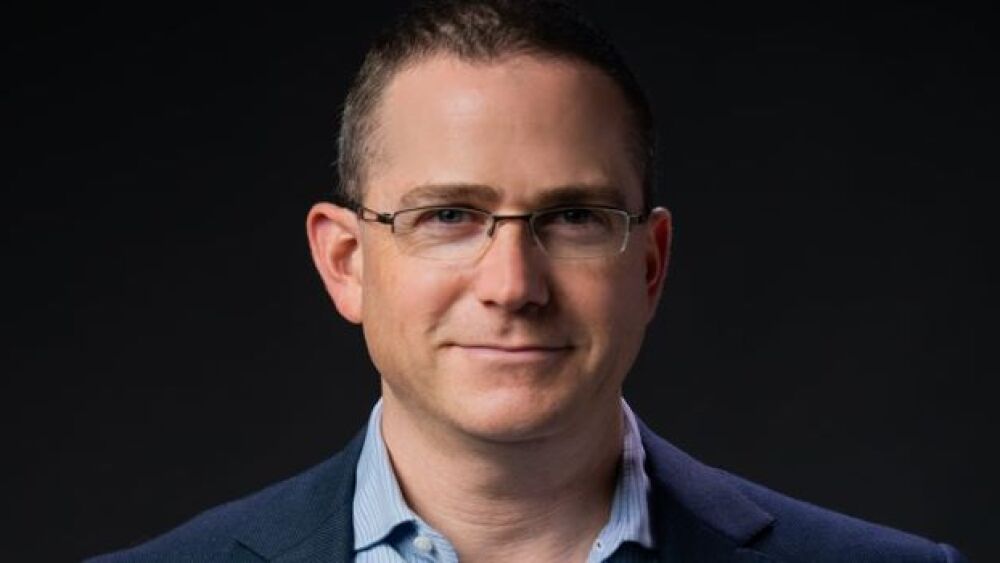Scorpion Therapeutics is on a mission to create a world where many more cancer patients can benefit from precision therapies. Earlier this year, it struck a $75 million alliance with AstraZeneca.
Adam Friedman, M.D., Ph.D./courtesy Scorpion Therapeutics
It’s a well-known fact that less than about 10% of cancer patients benefit from the precision therapies that are available today. Scorpion Therapeutics is at the forefront of that challenge, with a mission to create a world where many more cancer patients can benefit from precision therapies.
“That means being ambitious about the types of targets we pursue for small molecule chemistry,” said Adam Friedman, M.D., Ph.D., president and head of corporate strategy and business development, Scorpion Therapeutics, in an interview with BioSpace.
Scorpion targets well-validated drivers of cancer development and progression that are generally considered undruggable. But, as Friedman said, “They’re not undruggable. They just haven’t been drugged yet.”
The company’s ability to target those drivers is based upon its integrated, proprietary discovery platform that incorporates – essentially – all the tools drug hunters use today in a single toolbox. Removing the silos that often exist around these tools helps Scorpion’s discovery scientists better leverage their full capabilities, thus better-exploiting advances in genomics, data sciences and medicinal chemistry.
“It enables us to think outside the box, regarding what small molecule drugs can look like,” Friedman said.
A Covalent Hook
One key differentiator is Scorpion’s industrialized approach to chemical proteomics.
“Chemical proteomics is a transformational approach to identifying novel covalent inhibitors of challenging targets,” Friedman said. “It allows researchers to look across every protein expressed in a living cell, to identify the binding site for any compound in a screening library.”
The challenge is that many potential drug targets lack binding pockets in which small molecules can fit to inhibit the protein’s action. “So,” he said, “you often need a covalent hook to find these cryptic pockets and achieve the affinity needed for these very challenging targets.”
In addition to industrializing chemical proteomics, Scorpion has developed a proprietary covalent screening library that is purpose-built for chemical proteomics. It also has fully automated the molecule screening process and incorporated advanced data analytics algorithms that generate very low false-positive/false-negative rates.
“This allows us to move with tremendous speed from a primary screen into early discovery,” Friedman said.
“We are a target-centric company,” he emphasized. Rather than choosing targets based on the technology at hand, Scorpion first chooses “well-validated targets that we expect to have very clear precision medicine hypotheses in the clinic” and then brings the right combinations of technologies to bear.
“This allows us to have a truly technology-agnostic approach to targeting these drivers,” Friedman said. As a result, the company is identifying high-value oncology targets that others have been unable to see.
Two Programs Headed to the Clinic in 2023
Scorpion has also worked to dramatically tighten the development timeline.
“We broadly design these compounds and resource these programs with large numbers of chemists,” Friedman said. “Then, when we see a bit of data indicating the right direction, we move quickly toward it, without needing to wait for many additional assays to confirm it. That’s risky because there sometimes are dead-ends,” but this approach is integral to delivering crucial therapies to patients who often have few – or no – other therapeutic options.
Formed two and a half years ago, the company has already developed – without in-licensing – two compounds it expects to enter the clinic in 2023.
“That’s more than twice as fast as typical industry standards,” Friedman said. More than 15 other programs are in early discovery.
STX-478, Scorpion’s lead compound, targets PI3Kα, one of the most frequently mutated targets in all of cancer.
Existing, second-generation PI3Kα inhibitors are specific to the alpha isoform, but not to the mutation itself. Therefore, it causes metabolic dysregulation that presents as increased levels of insulin and glucose in patients. Scorpion’s version is an allosteric inhibitor that targets only the mutant PI3Kα isoform. In animal models, it is regressing tumors without metabolic dysregulation.
“PI3Kα mutations occur in a wide variety of solid tumors,” Friedman said. “A large percentage of them are in breast cancer – our focus – but also in lung cancer, gynecologic tumors, head and neck tumors and others, so we think STX-478 could benefit patients with many different subtypes.” Because this compound crosses the blood-brain barrier, it also may benefit patients who have PI3Kα-related brain metastases.
Scorpion’s second compound, STX-721, targets exon 20 mutations in the epithelial growth factor receptor (EGFR) protein. First-generation inhibitors had problems with selectivity, Friedman explained, which led to significant adverse events. To improve upon them, “We identified completely novel chemical scaffolds that are highly selective for exon 20 mutants over wild type,” he noted.
Scorpion presented preclinical data for STX-721 at the EORTC-NCI-AACR Symposium 2022 in Barcelona, Spain on Oct. 26. The compound proved its concept, demonstrating potential best-in-class selectivity and strong anti-tumor activity across multiple EGFR and HER exon 20 mutant CDX and PDX models.
Scorpion Therapeutics team/courtesy Scorpion Therapeutics
Adapting from the Start
Taking two drug candidates from discovery to IND-enabling trials in only two and a half years is a notable accomplishment. When Keith Flaherty, M.D., an international expert in targeted therapies and a serial entrepreneur, together with co-founders Liron Bar-Peled and Gaddy Getz, launched the company in 2020, the COVID-19 pandemic had just started.
“When I joined in March, the COVID-19 lockdowns were just beginning,” Friedman said.
Dealing with the lockdowns and all that accompanied them was probably Scorpion’s biggest challenge, but it also proved to be a benefit.
“Because we were built entirely virtually, and then became a hybrid company when we built incubator labs, we have been much more adaptable from the start,” he explained.
While much of the industry focused on developing vaccines or treatments for SARS-CoV-2, Scorpion focused on building its platform.
“We were fortunate that our vision for expanding precision medicine and building a deep and diverse discovery platform attracted significant early interest,” Friedman said. “We were able to raise nearly $270 million through two rounds of financing from outstanding blue chip venture investors, so capital has not been a significant issue for us.” Today, Scorpion still has runway well into 2024.
Scorpion was also was fortunate to attract team members with expertise encompassing structural biology, computational chemistry, molecular dynamics and biophysics, as well as cancer biology, target biology, proteomics medicinal chemistry, structure-based drug design and machine learning.
Most recently, Michael Streit, M.D., M.B.A joined the team as the company’s first chief medical officer. Streit previously was VP, senior global project head at Sanofi, and has significant experience in developing “bench to bedside” oncology therapeutics.
Because the platform assesses a large spectrum of small molecule inhibitors for validated cancer targets very quickly, Scorpion has also attracted the attention of potential pharmaceutical partners.
Earlier this year, it entered into what Friedman called “a transformational partnership with AstraZeneca,” that may well accelerate the ability to deliver precision oncology to patients. It comes with a $75 million upfront payment and success-based milestone and royalty payments.
The partnership leverages Scorpion’s integrated platform for novel approaches toward undruggable, high-value targets, focusing on transcription factors.
“No one has been able to target transcription factors before with small molecules, with the exception of certain ligand binding transcription factors like androgen receptors and estrogen receptors,” Friedman said. “AstraZeneca is one of the top oncology players. As an organization, it has deep expertise in discovery and development. It can scale what we do.
“What is remarkable about the Scorpion story is that in, essentially, two years we have two development candidates in IND-enabling studies,” he continued. “We will put those two compounds into the clinic next year, and have a deep pipeline behind them. Next year will be an important transformational year, as we go from a discovery to a development organization, and continue to demonstrate that our platform can deliver its promise.”






